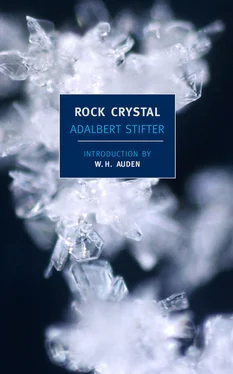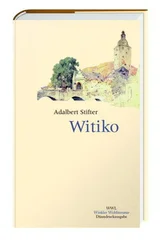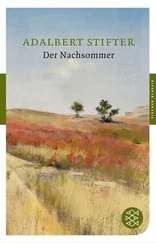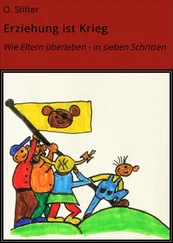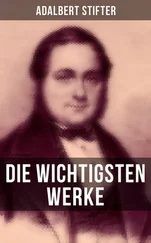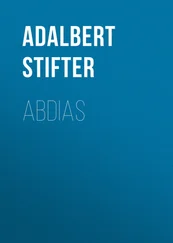The aforementioned minor exception, the only rival of the shoemaker, was Old Tobias who, in reality, was no rival at all, since by that time he merely did cobbling. He had plenty of work and it never occurred to him to compete with the fashionable shoemaker on the square, especially as the latter often provided him with patches, pieces of sole and the like, without charging for them. In the summertime Old Tobias would sit under the elder-bushes at the end of the village, working away. All about him were low shoes and mountain shoes, but it was the same with each pair — they were old, scuffed, discolored, and muddy. There were no high-legged boots among them because these were not worn in the village and valley of Gschaid. The only two persons who had such boots, the priest and the school-master, had their mending as well as their new work done by the shoemaker on the square. In winter Old Tobias stayed in his cottage behind the elder-bushes, which, since wood in Gschaid is not expensive, was always nice and warm.
The shoemaker on the square, before he inherited his house, had been a chamois-poacher and in general, so people said, not too model a youth. In school he had always been one of the best pupils. Later he had learned his father’s trade, and after working as a wandering journeyman, had finally come back to the village. But instead of wearing a black hat as becomes a tradesman — such as his father had worn all his life — he perched a green one on his head, stuck every available feather in it, and strutted about wearing the shortest frieze coat in the valley, whereas his father had always worn a dark coat, preferably black — since he was a man of trade — and invariably cut long. The young shoemaker was to be seen on every dance floor and at every bowling alley. If anyone tried to reason with him, he just whistled a tune. He and his marksman’s rifle were at every shooting match in the neighborhood and sometimes he carried home a prize — treasured by him as a great trophy. The prize was usually a set of coins artistically arranged. But the shoemaker, in order to win it, had to disburse many more similar coins, in his usual spendthrift fashion. He went to all the hunts in the neighborhood and had quite a reputation for being a good marksman. Sometimes, however, he fared forth alone with his blunderbuss and spiked shoes, and it was rumored that he had once received a serious wound on his head.
In Millsdorf just where the town begins, as you come in by the road from Gschaid, there lived a dyer with a thriving business in which he employed many workmen; and — something unheard of in the valley — he even made use of machinery. He was, moreover, the possessor of extensive farmlands. To woo the daughter of this prosperous dyer, the shoemaker would trudge all the way over the mountains. Noted far and wide for her beauty, she was also admired for her virtue, decorum, and housewifely accomplishments. Nevertheless, it would seem, the shoemaker attracted her attention. The dyer would not allow him to enter the house; and whereas the beautiful daughter had not previously gone to public places or taken part in festivities and had rarely been seen away from home, now she went nowhere but to church or into the garden or from one room to another in the house.
Some time after the death of his parents when he had become proprietor of the house where he now lived all alone, the shoemaker changed into a wholly different person. Whereas till then he was always rollicking about, he now sat in his shop, hammering away on sole-leather, day and night. He boasted that no one could make better shoes and footgear, and engaged only the best workmen whom he nagged and pestered a good deal as they sat at their work, making them follow his instructions and do exactly as he told them. The result was that not only did everyone in Gschaid who had always before got footwear from neighboring valleys, now come to him, but the entire valley as well. And as time went on, even people from Millsdorf and other valleys came to have their footwear made by the shoemaker of Gschaid. His fame traveled even into the plain so that many people who intended to climb the mountains had their special shoes made by him.
He kept his house spick and span, and shoes, mountain-shoes, and high boots gleamed on the shelves of the storeroom; and on Sundays when folk from all over the valley flocked to the village and stood around on the square with its four linden-trees, they liked to go over to the shoemaker’s and peep through the windows at all the people buying and ordering shoes.
In keeping with his love for the mountains, mountain-shoes were his best work, and he used to say in the common room at the inn that no one could show him a mountain-shoe made by anyone else that could compare with one of his. “They haven’t the knack,” he would add. “They can work all their lives and still they don’t know how a shoe like that should be made, so the nail-starred design has the heads of the nails at exactly the right place on the sole, with just the right amount of iron in them; so that the shoe is hard on the outside and no loose stone, however sharp, can be felt, and the inside lies as soft and tender against the foot as a glove.”
The shoemaker had had a big book made in which he entered all finished work, the names of those who had furnished the material, and of those who had bought the finished product, — together with a word about the quality of the goods, and this book was kept in the large chest in the store.
Now, although the dyer’s beautiful daughter stayed at home most of the time and visited neither relatives nor friends, the shoemaker from Gschaid managed it so that she should catch a glimpse of him when she went to church, walked about the garden, or looked from the windows of her room. Because of this constant gazing, the dyer’s wife by long, insistent, unremitting supplications induced her stiff-necked husband to give in, and the shoemaker (who had, after all, mended his ways) carried off the beautiful and wealthy maiden of Millsdorf as his bride. The dyer, however, was a headstrong person. The right sort of man, he said, has an occupation, makes it thrive and grow, and thereby supports his wife, children, himself and domestics; he keeps his house in order and lays by a goodly nest-egg which is the only thing that gives a man dignity and standing in the world. Thus it was that the only dowry his daughter received was a well-filled hope chest, the rest was the husband’s concern — for the present and in future. The dyeworks in Millsdorf with its farmland was a business worthwhile in itself, besides reflecting credit on its owner; and since all of it was, in a sense, capital, he would give none of it away. But once he and his wife had died, the dyeworks and farmland would fall to their only daughter, namely the shoemaker’s wife in Gschaid; and the shoemaker and his wife might then do with them as they pleased: provided, that is, that the heirs were worthy; should they be unworthy, they would get only the legal share, the inheritance going to their children, and if there were none, to other relatives. Nor did the shoemaker make any demands, showing proudly that all he had wanted was to win the dyer’s beautiful daughter, and that he was well able to keep her and care for her as she had been kept and cared for at home. And, as his wife, he dressed her not only better than any of the women of Gschaid and of the valley were dressed, but better even than she had been at home, and meat and drink and everything about the house had to be better and choicer than anything she had enjoyed in her father’s house. And to spite his father-in-law, he bought more and more land, so that he came finally to possess a considerable property.
Since the people of Gschaid seldom leave their valley and almost never go to Millsdorf, from which they are separated by mountain and by customs — and since, furthermore, no one ever leaves his valley to settle in a neighboring one — although removals to great distances occur — and lastly since no girl ever leaves her valley except on the rare occasion when, obeying the dictates of love, as a bride, she follows her husband into another valley — so it came about that after the beautiful daughter of the dyer of Millsdorf married the shoemaker of Gschaid she was still regarded by the people of Gschaid as a stranger; and although they were not unkind to her, and even loved her for her charm and virtue, there was always something, reserve or a sort of shy respect, that kept her from enjoying the same familiarity and warm intimacy that existed between the people that belonged to the valley. That’s the way it was and no use talking about it. And the finer clothes and easier domestic life of the shoemaker’s wife only made it worse.
Читать дальше
